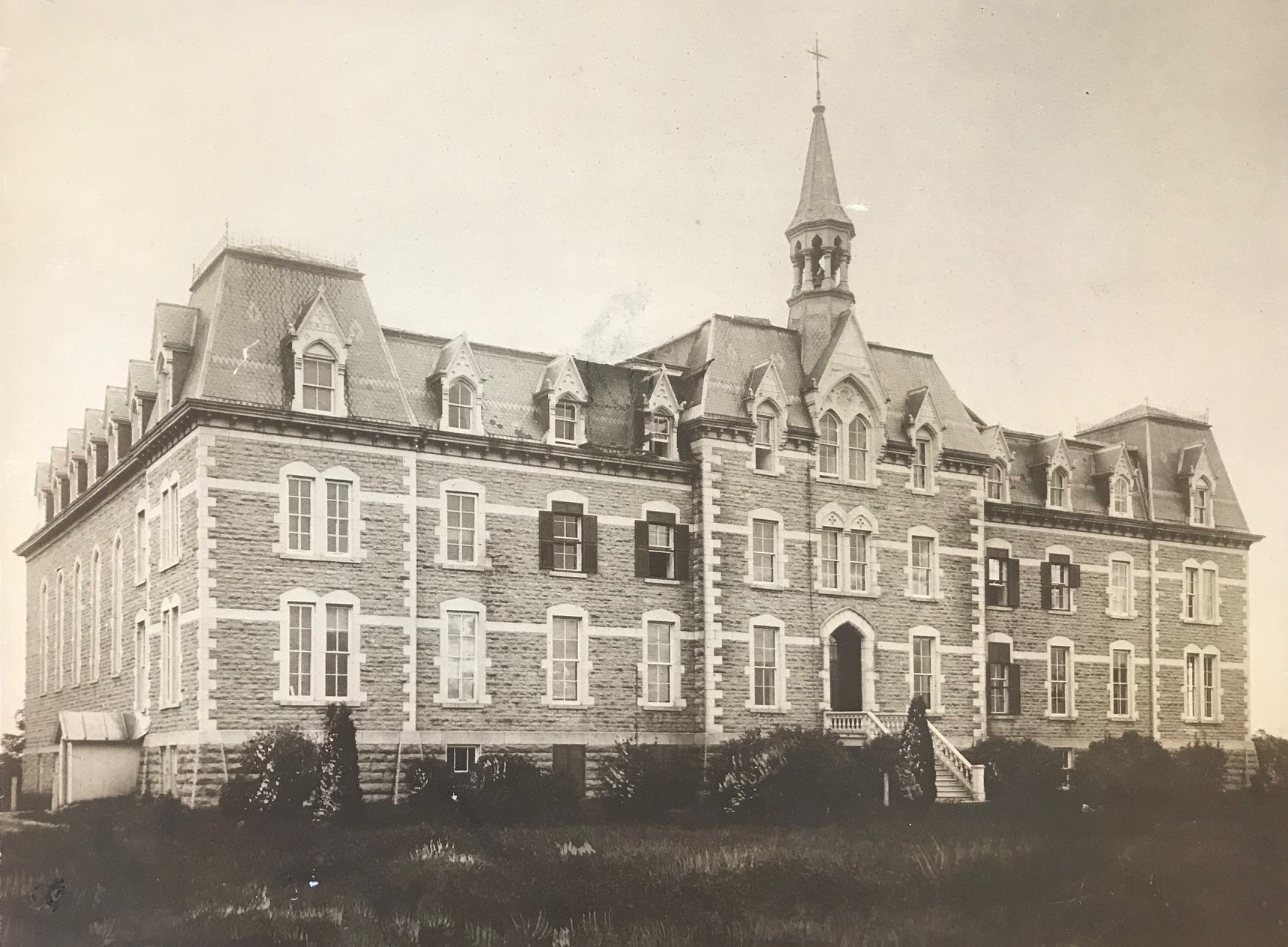1848
The origin of Saint Paul University dates back to September 26, 1848, when “The College of Bytown” was founded by Bishop Joseph-Eugène Guigues, O.M.I., who in 1856 officially entrusted the College to the Oblates of Mary Immaculate.
Miigwetc sa kidinim oma kabihek, Saint Paul kikinamadimigwam Anishnabe akikak ka padigisik
Niwi tibadjimanan sa Anishnabek e kitenimak e kipiodamwact Akini acitc nibini
Anishnabe mega omigwam Ottawa, mi oma eji nickidadiotc kidji madinimagiotc obimadizinawa
Pekadendomwinkak acitc minadjidiwinkak kigeji mino tajikemin kakina edinizik oma Anishnabe otaki
We want to thank everyone who is present and acknowledge that Saint Paul University is located on the traditional unceded territory of the Anishinabe-Algonquin Nation.
We would like to honour the Anishinabek who are the caretakers of the lands and waters of the Kitchi Sibi (Ottawa River Valley) since time immemorial.
We acknowledge that the site of the City of Ottawa serves as the home of the Anishinabek, as a place for spiritual ceremonies, cultural gatherings, and exchanges among Indigenous people across Turtle Island.
Today, this spirit of peace and friendship is the foundation of relationships among Indigenous and non-Indigenous peoples, from around the globe.

Located in the heart of the nation’s capital, Saint Paul University (est. 1848) is the founding college of the University of Ottawa, with which it has been federated since 1965. A bilingual institution, it offers undergraduate and graduate study programs.
Proud of its rich heritage, over the years Saint Paul University (SPU) has evolved into an institution whose primary focus is on the multiple facets of the human experience. Not surprisingly, that priority is reflected in our current study programs: in addition to our founding disciplines—Canon law, Philosophy, and Theology—we offer courses in social communication, Social Innovation, Leadership, Ecology & Equity, Counselling and Psychotherapy, Public Ethics, Conflict studies, and Human relations and Spirituality.
Besides its academic programs, SPU offers a number of complementary services, including support and guidance to help students succeed academically and personally; access to symposiums, conferences and workshops with distinguished specialists in the areas of issues facing today’s society; a student residence; and a library with an outstanding collection of documents and books on a range of specialized subjects.
SPU is known for its small class sizes, personalized service, diverse student population and international vision, solid reputation, rich history, and Catholic intellectual tradition.

The origin of Saint Paul University dates back to September 26, 1848, when “The College of Bytown” was founded by Bishop Joseph-Eugène Guigues, O.M.I., who in 1856 officially entrusted the College to the Oblates of Mary Immaculate.
The college was renamed Ottawa College in 1861.
On August 15, 1866, it was elevated to university status by the Union government.
By apostolic letters of Leo XIII, dated February 5, 1889, the College of Ottawa also became a university of pontifical right.
The civil charter, which had been rewritten, was approved on April 18, 1933 by the Ontario Provincial Legislature and the University was henceforth officially known as “University of Ottawa”.
To meet the requirements of Pius XI’s Apostolic Constitution, Deus Scientiarum Dominus, on the reorganization of Catholic universities, the administration revised its pontifical charter which was subsequently approved by Rome on November 15, 1934.
In the years following World War II, the University progressed rapidly and by 1965, had established nine faculties and four schools. The year 1965 marked the end of one era and the beginning of another. On July 1st, through an Act of the Ontario Provincial Legislature and after laborious negociations between the University and the Provincial Government, the institution heretofore designated as the University of Ottawa became Saint Paul University, nonetheless keeping its civil and canonical charters. At the same time the Provincial Government formed a new institution to be known as the University of Ottawa to which Saint Paul University conceded the majority of its holdings. The two Universities became a federated complex and according to mutual agreement were to share faculties.
In addition to conferring its own degrees, Saint Paul University reserves the right to present its candidates to the Senate of the University of Ottawa for the joint conferment (Saint Paul University – University of Ottawa) of its certificates, diplomas and civil degrees.
Both Universities consider themselves complementary institutions. Saint Paul University appoints eight members to the Board of Governors of the University of Ottawa.The Rector of Saint Paul University is a member of the Senate of the University of Ottawa, and the Faculties of Saint Paul University are also represented in the academic Senate of the University of Ottawa by their Dean, Secretary and a professor elected by his or her colleagues. Moreover, the two Universities benefit from a mutual exchange of professors and they mutually recognize their courses.
Saint Paul University with strong traditions is fully aware of its special mission and possibilities. Its geographical location, its bilingual character, its federation with the University of Ottawa, its competent and diversified teaching staff, contribute to the quality of the academic training and the Christian culture which it endeavours to guarantee.
Saint Paul University is a research and higher education community entrusted to the Congregation of the Missionary Oblates of Mary Immaculate.
We freely explore knowledge according to the Catholic intellectual tradition, which is open to continuous conversation between faith, reason and culture.
We commit ourselves to seek the truth, to promote human dignity, justice, peace and the integrity of creation, as well as to put education at the service of the poor, while respecting Oblate values.
Bilingual and inclusive, we foster mutual understanding between believers of all traditions and non-believers, as well as between cultures.
We integrate learning and research with social engagement, thus making it possible to offer a unique student experience. The University participates in dialogue on contemporary issues and is strongly focused on social justice.
Support transformative leadership on the part of individuals and communities for:
Engaged. Human. Open. Spiritual.
The Catholic identity and the ecumenical character of Saint Paul University favour a learning environment that allows students to explore existential questions following the Catholic intellectual tradition. This helps our students to understand and navigate the pluralism so characteristic of today’s world, and to interact confidently with that world.
To be human is to recognize the ephemerality of life and acknowledge one’s limitations and vulnerability; to recognize that one can find the true meaning of life only through one’s relationships with nature, with others, and with God. We firmly believe that in our age of increasing globalization, university research and teaching should contribute to the modern project of making our world a better, more humane community.
Saint Paul University offers an open and safe environment where no one is a stranger or an outsider. Our university welcomes all who want to journey together along the pathway to learning, discovery, excellence, service, and personal growth.
To be engaged is to understand that through conscious and decisive actions, and by joining forces with others, each and every one of us can help build a stronger, more humane global community. That’s why Saint Paul University uses an approach that combines theory with practice.
The Deputy Minister University Champion (DMUC) Initiative was launched in 2002 by the Canada School of Public Service (CSPS) to create a strong relationship between the University Sector and the Public Service. Deputy Minister University Champions across Canada work with their university partners to:
For more information on the Deputy Minister University Champion Initiative, visit the Canada School of Public Service website.

Arianne Reza became Associate Deputy Minister of Public Services and Procurement Canada (PSPC) in August 2021.
Prior to this appointment, Arianne was the senior official responsible for federal procurement. She oversaw 1,400 employees across Canada that procure more than $14 billion worth of goods and services annually on behalf of over 100 federal departments and agencies. In response to the COVID-19 pandemic, Arianne led the urgent procurement of critical goods and services to ensure the health and safety of Canadians, including vaccines and personal protective equipment.
Arianne directed the development and implementation of procurement modernization initiatives in the Government of Canada, such as the implementation of a modern, cloud-based electronic procurement solution. During her tenure, Arianne also guided the establishment of PSPC’s Accessible Procurement Resource Centre, the implementation of social procurement pilots, the improvement of payment timeliness to suppliers from 30 to 15 days, and the launch of the Policy on Ethical Procurement of Apparel.
Arianne has over 25 years of experience in the federal public service. Throughout her career, she held many interesting positions.
Arianne previously worked at the Canada Border Services Agency, where she held senior executive roles in regional and international operations and overseeing commercial and traveller border programs. She was also previously Special Advisor to the Associate Secretary of the Treasury Board, and Special Advisor to the President of the Canada School of Public Service.
Arianne holds a bachelor’s degree in psychology from Carleton University and completed the Advancing Women in Leadership Program from the Sprott School of Business.